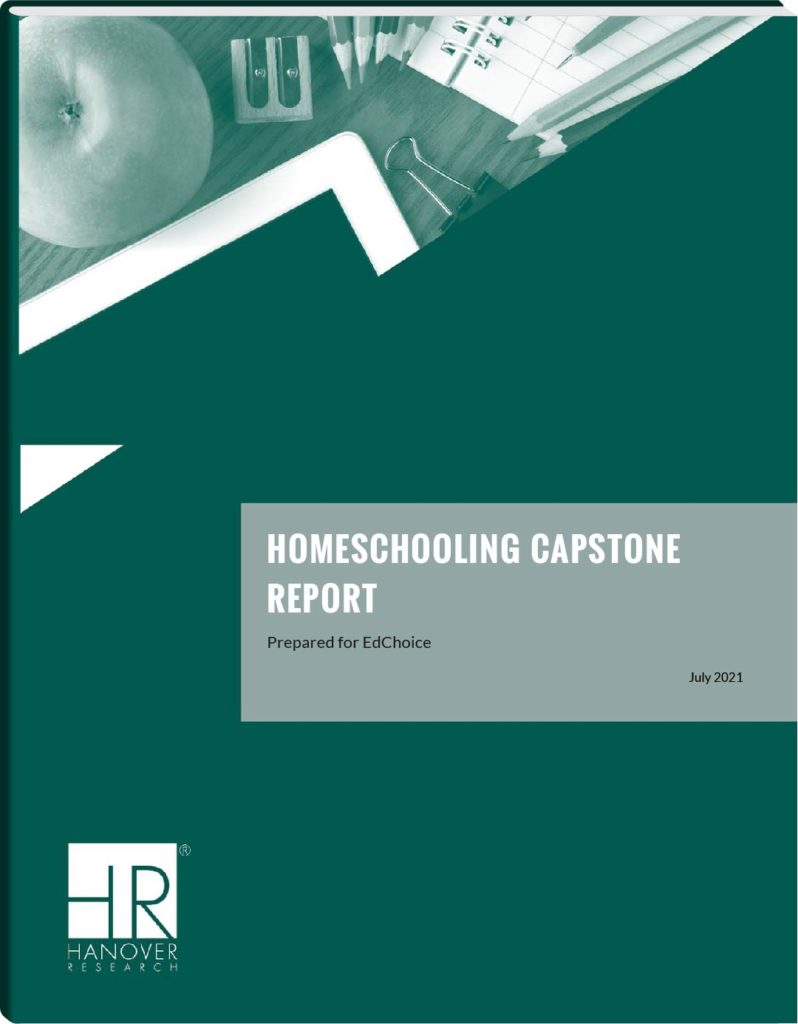A Portrait of American Homeschooling in 2021
Throughout the course of this year, we at EdChoice have been conducting in-depth research on homeschooling in America. We were prompted by the reports, both anecdotal and statistical, that point to growth in homeschooling as a result of the coronavirus pandemic. But perhaps more than that, we wanted to inform the conversation about homeschooling, a conversation that is frequently rife with stereotypes and assumptions that don’t fit with reality.
We partnered with Hanover Research to survey a nationwide sample of homeschoolers as well as families that considered homeschooling this year. Earlier this summer we released the results of that survey. Hanover also conducted a series of focus groups for us, both with homeschoolers and with families who personalized their children’s learning in some other way this school year. That was released a few weeks later.
Today, we are publishing a final “capstone” paper that synthesizes the findings of the survey and the focus groups. Each supplements the other, with the survey providing a sample size that allows us to generalize the findings and the focus groups diving deep into the opinions and practices of homeschoolers.
What are the key takeaways?
COVID-19 dramatically increased interest in homeschooling. The pandemic was the most common factor in families’ decision to homeschool this year. In total 58 percent of homeschoolers said that the pandemic was “extremely important” in their decision to homeschool and another 20 percent said that it was “very important.”
As a point of comparison only 23 percent of homeschoolers said that providing religious instruction for their children was “extremely important.” Looking at the entire sample of the survey, 27 percent of respondents said that they were “much more interested” in homeschooling as a result of the pandemic, and 39 percent were “somewhat more interested.” Only 7 percent said that they were “somewhat less interested” and 3 percent said that they were “much less interested.”
People are satisfied with homeschooling. Sixty-eight percent of homeschooling parents stated that their children were learning more from home, and 65 percent said that their children were enjoying learning more and were more interested in their schoolwork. Sixty-eight percent of homeschoolers reported increased happiness and another 60 percent reported improved behavior. When survey respondents were asked to rate varying schooling sectors’ responses to the pandemic, homeschooling got the highest marks, with 70 percent of respondents saying that they had a “somewhat” or “very positive” opinions of homeschooling, compared to only 48 percent for private schools, 45 percent for traditional public schools and 43 percent for charter schools. Homeschooling parents reported a host of positive effects of homeschooling.
Something that might surprise those unfamiliar with homeschooling is how many families of children with special needs are drawn to it.
Fifty-two percent of respondents said that their child’s special learning need was “very” or “extremely” important in their choice to homeschool.
As one focus group participant put it, “My 11-year-old has some special needs. He’s got autism on the mild end of the spectrum, but still definitely challenging, and some attention deficit issues. He really does need a lot of one-on-one attention. We just weren’t seeing that in the school.”
Amazingly, when asked about the benefits of homeschooling 34 percent of parents reported that their children no longer received treatment for behavioral or medical issues, and they were quite happy about that.
Homeschoolers love flexibility and take advantage of it. When asked why they homeschool, 68 percent of respondents said that more flexibility and individual attention was “very” or “extremely” important to them.
During focus group conversations, moderators dug into what that flexibility looks like, and it is families experimenting with the school day, week and year. It is trying different curricula and online resources. It is bringing in outside resources like museums into the learning process. As a homeschooling parent said, “There’s really no right or wrong way to homeschool your kid. It’s whatever fits their needs.”
Families aren’t just pulled into homeschooling, they are also pushed. When asked about why they homeschool, parents frequently cited what we might think of as positive reasons to homeschool (more flexibility, they want more one-on-one attention, etc.), but it is also true that many families homeschool because they have had horrible experiences in traditional schools.
These experiences span from academic challenges to social and interpersonal challenges. Families reported poor quality instruction and clashes with teachers as motivations to homeschool. The pandemic gave many families the first real look into what goes on in their child’s classroom every day as it was beamed into their living room, and, as one parent put it, “Distance learning gave us a chance to shadow the classroom and see what was actually going on. Some of it was quite disappointing.” Families also discussed negative social experiences running the gamut from children not fitting in to children falling in with a bad crowd.
No homeschooler is an island. Far from the stereotype of the lone homeschooler isolated and atomized, respondents both described ways in which they networked with other homeschooling families and expressed desires to do it more.
One focus group participant talked about using the app Nextdoor to let her neighbors know that she was a first-time homeschooler and found a neighbor that had a child a grade older than hers who was a homeschooler and was willing to help her out. Homeschoolers work with friends and family members and even with more formal organizations like co-ops, though our respondents were less likely to say that they used more formal structures than informal ones. Finding ways to better network homeschoolers is something that those interested in growing and sustaining homeschooling would be wise to support.
The full report is worth reading. Click the report cover below to start digging in. Let us know what you think!





